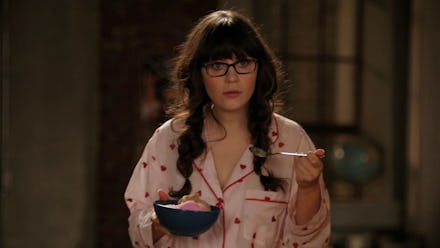2013 Was a Huge Win For Women in Television

With the current situation for women in Hollywood at the moment, I didn't hold high hopes for the Golden Globe nominations. However, I was pleasantly surprised.
While the picture isn't exactly rosy for the female writers and directors (per usual), I couldn't help but notice the Best Actress in a Television Comedy nominees. In an industry where the roles of women are largely defined by the men around them, all of the nominees in this category are the headliners in their own show: Zooey Deschanel in New Girl, Edie Falco in Nurse Jackie, Lena Dunham in Girls, Julia Louis-Dreyfus in Veep, and Amy Poehler in Parks and Recreation. These women are all stars in their own right — not supporting players.
What's more, these shows feature a bevy of strong female characters (maybe with the exception of New Girl, though it has seen its share of excellent female guest stars). Parks and Recreation is perhaps the best example of this — Girls is not far behind — with stars like Aubrey Plaza, Rashida Jones (though not for long), and Retta to support the incomparable Poehler. The Hollywood Foreign Press Association (HFPA) seems to be leading the way in honoring women and female-centric roles. Let's not forget who's hosting the ceremony after all.
Even the Best Actress in a Television Drama nominees are, for the most part, the most integral element of their respective series'. What would Scandal be without Kerry Washington? Orphan Black is Tatiana Maslany and Juliana Marguiles is the heart and soul of The Good Wife. With Taylor Schilling in the basically all female Orange is the New Black, House of Cards' Robin Wright is the only lead female television nominee who does not headline the show she's nominated for. Even in the case of Wright, though, her character is easily one of the most integral and interesting on the show, so I'd call that a win.
This shouldn't be a surprise. Television has been hailed as the home of the best female characters, and, despite the high quality of this year's female film nominees, this has proven to be true. The year 2012 saw the smallest number of speaking roles for women in film in the five years prior, and, correct me if I'm wrong, but speaking is usually essential to a quality film role (Marlee Maitlin notwithstanding). This in the same year that almost half of shows in primetime feature female narrators. When a country has to introduce an entire rating system (however flawed) to ensure women are being represented in film, there's an issue.
The question remains, why is television so much better at featuring women? It could be that the women now outpace men in the amount of television they watch. Certainly UK women would rather watch TV than have sex — maybe the same is true here. These reasons notwithstanding, I'm not sure what accounts for the difference in quality between female roles in television and in film. Maybe it's that advertisers realize women are making money to spend. Or that the film industry is still in denial about the number of women who buy movie tickets. Whatever it is, actresses are clamoring to star in the next big television show, because even the non A-listers are getting quality roles (and at times, this choice comes at the expense of film success).
However, I don't want to give a false picture of the television industry. It might be better than the Hollywood movie machine, but it still has issues. For every one Jessica Day or Leslie Knope featured on prime time television, there are 1.57 male characters. And women are still likely to be overly sexualized on TV.
Let's hope, though, that the example the HFPA is setting with its choice of television nominees will pave the way for the portrayal of women across all media. I can't wait for the day when the film industry features its own Selina Meyer or Hannah Horvath. Until then, my evenings will be reserved for HBO, not the multiplex.